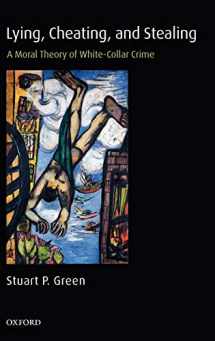
Lying, Cheating, and Stealing: A Moral Theory of White-Collar Crime (Oxford Monographs on Criminal Law and Justice)
ISBN-13:
9780199268580
ISBN-10:
0199268584
Edition:
First Edition first Printing
Author:
Stuart P. Green
Publication date:
2006
Publisher:
Oxford University Press
Format:
Hardcover
320 pages
Category:
Business Ethics
,
Management & Leadership
,
Criminal Law
,
Criminology
,
Social Sciences
,
Business Culture
FREE US shipping
Rent
35 days
Due Jun 22, 2024
35 days
from $11.43
USD
Book details
ISBN-13:
9780199268580
ISBN-10:
0199268584
Edition:
First Edition first Printing
Author:
Stuart P. Green
Publication date:
2006
Publisher:
Oxford University Press
Format:
Hardcover
320 pages
Category:
Business Ethics
,
Management & Leadership
,
Criminal Law
,
Criminology
,
Social Sciences
,
Business Culture
Summary
Lying, Cheating, and Stealing: A Moral Theory of White-Collar Crime (Oxford Monographs on Criminal Law and Justice) (ISBN-13: 9780199268580 and ISBN-10: 0199268584), written by authors
Stuart P. Green, was published by Oxford University Press in 2006.
With an overall rating of 3.7 stars, it's a notable title among other
Business Ethics
(Management & Leadership, Criminal Law, Criminology, Social Sciences, Business Culture) books. You can easily purchase or rent Lying, Cheating, and Stealing: A Moral Theory of White-Collar Crime (Oxford Monographs on Criminal Law and Justice) (Hardcover, Used) from BooksRun,
along with many other new and used
Business Ethics
books
and textbooks.
And, if you're looking to sell your copy, our current buyback offer is $0.3.
Description
The picture of crime that dominates the popular imagination is one of unambiguous wrong-doing - manifestly harmful acts that are clearly worthy of condemnation. The accompanying picture of the criminal - the thief, the murderer - is a picture of society's failures - to be cast out and re-integrated through a process of punishment and penance. Our understanding of white-collar crime, by contrast, is pervaded by moral and imaginative ambiguity. Such crimes are committed by society's success stories, by the rich and the powerful, and frequently have no visible victim at their root. The problem of marrying these disparate pictures has led to a confusion of the boundaries of white-collar crime. How is it possible to distinguish criminal fraud from mere lawful "puffing," tax evasion from "tax avoidance," insider trading from "savvy investing," obstruction of justice from "zealous advocacy," bribery from "log rolling," and extortion from "hard bargaining?" How should we, as scholars and students, lawyers and judges, law enforcement officials and the general public, distinguish the lawful from the unlawful, the civil from the criminal?In the first in-depth study of its kind, Stuart Green exposes the ambiguities and uncertainties that pervade the white-collar crimes, and offers an approach to their solution. Drawing on recent cases involving such figures as Martha Stewart, Bill Clinton, Tom DeLay, Scooter Libby, Jeffrey Archer, Enron's Kenneth Lay and Andrew Fastow, and the Arthur Anderson accounting firm, Green weaves together disparate threads of the criminal code to reveal a complex and fascinating web of moral insights about the nature of guilt and innocence and what, fundamentally, constitutes conduct worthy of punishment by criminal sanction.Green argues that white-collar crime is best understood through a framework of everyday moral concepts that include not only lying, cheating and stealing, but also coercion, exploitation, disloyalty, promise-breaking, disobediance, and other forms of deception. In the process, he reveals the essentially moral fabric underlying the legal category of white-collar crime.


We would LOVE it if you could help us and other readers by reviewing the book
Book review

Congratulations! We have received your book review.
{user}
{createdAt}
by {truncated_author}


